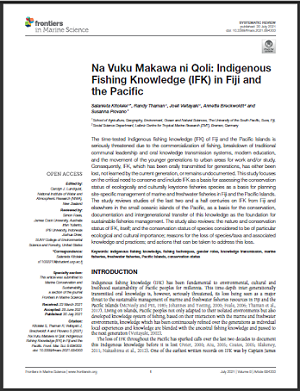
The time-tested Indigenous fishing knowledge (IFK) of Fiji and the Pacific Islands is seriously threatened due to the commercialization of fishing, breakdown of traditional communal leadership and oral knowledge transmission systems, modern education, and the movement of the younger generations to urban areas for work and/or study. Consequently, IFK, which has been orally transmitted for generations, has either been lost, not learned by the current generation, or remains undocumented. This study focuses on the critical need to conserve and include IFK as a basis for assessing the conservation status of ecologically and culturally keystone fisheries species as a basis for planning site-specific management of marine and freshwater fisheries in Fiji and the Pacific Islands. The study reviews studies of the last two and a half centuries on IFK from Fiji and elsewhere in the small oceanic islands of the Pacific, as a basis for the conservation, documentation and intergenerational transfer of this knowledge as the foundation for sustainable fisheries management. The study also reviews: the nature and conservation status of IFK, itself; and the conservation status of species considered to be of particular ecological and cultural importance; reasons for the loss of species/taxa and associated knowledge and practices; and actions that can be taken to address this loss.













